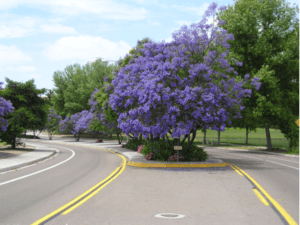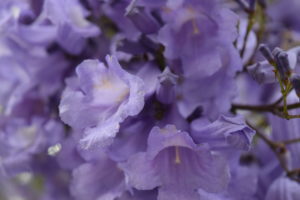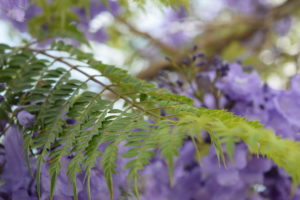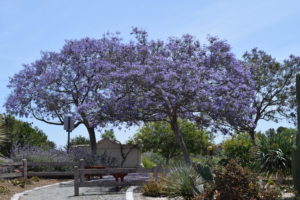
Jacaranda trees are tropical beauties with clusters of fragrant, purple, trumpet-shaped blooms which are 1-1/2 inch long curved with inner white throats.

The heaviest-flowering happens when grown in full sun, it can tolerate light shade and will grow quickly. Jacarandas often have an open, irregular and oval headed growth habit; its stout trunk, gray rectangular flaked bark and alternately arranged finely divided bipinnately compound leaves that are at least a foot long and composed of 1/2 inch long narrow elliptical leaflets that give the tree a delicate fernlike appearance.

Jacarandas thrive in sandy, well-drained soils but should be watered during dry periods. Plant in full sun with occasional deep summer watering and preferably in a soil that drains well.
Jacarandas will often survive in heavier soils but growth is slow and sometimes stunted; flowers and leaves may cause a lot of litter when they drop.

Jacaranda trees tend to form vertical suckers when pruned that distort the shape of the tree. If pruning, only remove broken or diseased branches; so avoid pruning your Jacaranda.
Scientific Name: Jacaranda mimosifolia
Common Name: Jacaranda
Family Name: Bignoniaceae Origin: Brazil
Plant Type: Tree Leaf Type: deciduous
Density: open Texture: fine
Height ft. 25′-40′ Width ft. 15′-30′
Form: irregular, oval Growth Rate: fast
Leaf Type: bipinnately compound, odd-pinnately compound
Leaf Arrangement: alternante
Leaf Shape: obovate; rhomboid Leaf Size: 2″
Leaflet Size: Leaf Margin: entire
Leaf Color: green Leaf Fragrance: yes
Flower Showy: yes Flower Cluster Type: panicle
Flower Season: Spring – Summer Cut Flower: no
Flower Fragrance: yes
Flower Color: purple, blue, lavender Fruit Type: round, pod-like
Fruit Size: 1-3″ Fruit Edible: no
Fruit Color: brown Fruit Showy: yes
Bark Color: gray-brown Root Type: surface roots
USES: : large parking lot islands, wide lawns, shade trees, specimen tree, residential street tree, mass planting.
Sun Exposure: full sun Climate: zones 12-24
Water: water during dry periods, deep and infrequent.
Pruning: no
Propagation: cuttings, grafting, seeds
COMMENTS: Pruning Jacarandas will spoil their good looks, and the tree’s shape. When you prune a Jacaranda it then sends up vertical shoots. The normal shape for a Jacaranda is that of an elegant umbrella, and the appearance of vertical branches ruins its good looks.
Jacarandas are well-suited for cooling patios, but should not be used near pools due to the abundant leaf and flower drop.













